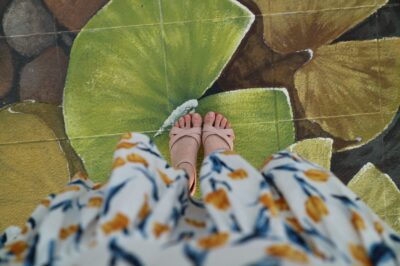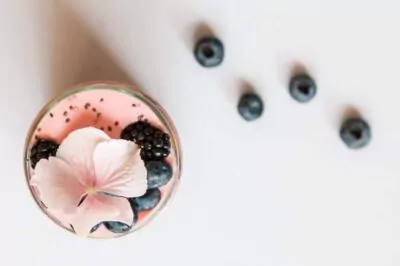Table of Contents[Hide][Show]
Annmarie Skin Care is all about being pure, natural and nurturing.
So I thought it appropriate to talk about the skin we women don’t often talk about!
Our vulva.
Yes, I said it! Our vulva! And all the sensitive tissue “down there”.
What’s Up With the Skin in Our Most Sensitive Feminine Zone?
Even younger women can have dry and irritating tissue around the vulva as well as the vagina. Women who take the pill for example; or those that take any number of other medications, may have a drying side effect “down there” (1)
And older women, those going through peri-menopause or menopause, are going to experience vaginal dryness and other symptoms due to natural hormone decline.
Vaginal dryness affects women of all ages.
We have a number of vital sexual hormones that start to decline as early as our thirties. Progesterone starts to decline, along with estrogen and also our androgens. Androgens include the sex hormones DHEA and testosterone (yes, women have–and need–testosterone!). Receptors for these hormones are found all over our feminine down-under, in the vulva, clitoris, urethra, vagina and uterus; as well as throughout the musculature of our pelvic floor.
Ahhhh…that is why as we age we start to see a weakening of our pelvic floor (and that is important as our diminishing pelvic musculature health is why we start to leak when we laugh, cry and squat!)!
This Hormone Decline Causes Physical and Mental Symptoms which Impact Our Lives
Physical Symptoms
- Diminished natural lubrication
- Yes, things can start to hurt…whether that discomfort occurs during intercourse or while simply doing things we enjoy, like riding a bike or doing our daily jog
- A reduction in elasticity of the vagina, and thinning of surrounding tissue
- An increase in vaginal pH and decrease in healthy vaginal flora (aka: more infections, odors and irritation)
- Increased skin disorders affecting the urogenital tract such as vulvodynia, vestibulitis, and dermatitis
- Pelvic prolapse symptoms (urinary leakage, pressure, and trouble eliminating)
And unlike hot flashes associated with menopause and aging, which eventually will end at some point even without treatment, vaginal dryness and these other symptoms usually increase in severity over time. (2)
Mental Symptoms
- You may suffer from anxiety relating to worsening symptoms of dryness, discomfort or incontinence (Where is the closest bathroom? Will my panty-liner hold up? Why does it have to hurt so much?)
- You may be feeling older than your years
- Your self-esteem may be dwindling or literally in the toilet
- Your relationship may be suffering due to either your physical discomforts during sex…or your fear of that discomfort
- You may suffer from decreased desire, arousal and orgasm – the decline in androgens are particularly associated with diminishing libido (3,4)
Dryness, discomfort and a little leakage…unfortunately… becomes the “accepted” norm!
But does it really have to be that way?
I say “no”! And I’ll tell you why in a moment.
But first, let me address a question that I sometimes get from older women…and that relates to whether symptoms related to vaginal dryness are important for them to address…because, after all, they aren’t sexually active.
Let me just make sure everyone understands that even outside of sexual intercourse it is important to address vaginal discomfort. It is a quality of life issue but also has ramifications to your health as you age.
What Impacts can Vaginal Dryness Have to Your Ongoing Health?
- If you don’t address vaginal dryness you may see more urinary tract infections
- Vaginal and vulva dryness can cause pain and discomfort outside of intercourse, while doing your favorite things (horseback riding, gardening, Zumba class, etc.) or even during your gynecological exam and/or Pap smear. Over the years when I had my practice I saw many patients who had tremendous discomfort even wiping due to the sensitivity of their vulva and surrounding tissue
- Vaginal dryness can be a warning sign of sorts relating to your declining hormone levels…your body is telling you that your “lady bits” need attention. These same declining hormones can cause urgency symptoms and even incontinence…
- Lack of sex can actually create more dryness due to reduction in overall blood circulation in the vagina; healthy blood circulation can alternatively help counter dryness
Women Don’t Have to Live with These Symptoms
There are many steps you can take–starting today–to improve upon your “desert-down-under!” The more preventative you can be, the better!
First, you need to take care of your sensitive lady parts. Just like you may use pure and natural Annmarie Skin Care products for the rest of your skin…focus on reducing irritating and toxic chemicals that your lady parts may be exposed to. Check the labels for bubble baths, soaps and even those moisturizers and lubricants you purchase to aid with comfortable intercourse. Many actually contain ingredients that can cause irritation. And you certainly want to be sure to stay away from known endocrine disruptors.
Treat your lady-parts with love…use toxic-free and non-endocrine-disrupting products.
Second, go to your gynecologist and ask questions. Have a discussion, don’t just sit there and feel embarrassed! Research shows that women just don’t bring up vaginal dryness and related symptoms when they visit their doctor. Some are embarrassed; others don’t feel there is anything they can do about it.
As a gynecologist I often had patients sit there and answer “no problem” to my questions…and then…on their way out, maybe…finally….mention something about pain or leaking. On the way out! And I was a female, caring gynecologist…but for some reason they still felt they just had to deal with it. We need to change this!
Third, continue to educate yourself on your body, especially relating to hormone changes that naturally occur as we age. Do you even know where you vulva is? If not, check out my video, “Grab a mirror and let’s find your vulva.” This area is often one of the first to experience dryness and irritation. I mean, think about it…even as you walk this area is under constant friction.
And when you talk with your doctor about your symptoms, if he/she doesn’t suggest it, ask about hormone testing. It is so important to know where your hormone levels are, so you can do something about correcting their levels (and reducing the symptoms that are impacting your life!).
Fourth, yes, go ahead and use lubrication, but just like you use skin care products like Annmarie Skin Care’s that don’t contain additional chemicals, make sure your lubricant is pure and natural, too. Some favorites of mine include organic coconut oil and Ayurveda ghee. Never use essential oils straight into the vagina. Always use a carrier oil and test the resulting lubrication on your inner arm first. Good ones to add that I have found to soothe vaginal tissue are frankincense, sandalwood, rose and lavender.
Fifth, bump up your essential fats and probiotics! Yes you can eat your way to more moist and healthier skin. Choose lots of fermented foods rich in probiotics or supplement with a quality probiotic. Add in healthy fatty food choices like oysters, avocado (one of my favorites), salmon (wild caught of course), olive oil and butter from free range cows. Foods rich in omega-3 fatty acids help reduce inflammation, support healthy skin and are also supportive of balanced hormones!
(Read more about foods you should – and shouldn’t – be eating here)
Sixth, get that blood flowing around your lady parts! Easiest way? Kegel exercises can help to keep things from drying out while improving musculature and elasticity. Many women do not do Kegel exercises…and even those that do often do them incorrectly. Do you know how to do the perfect Kegel? Learn how in just a few minutes.
Hormonal Treatment Options
Now before you run screaming at the words “hormone treatment” let me say you should educate yourself on the options. There are many things you can try and if you are working with your doctor you can choose the best—and safest—option for you.
Women having had breast cancer are usually advised to stay away from estrogen options. In particular oral doses of estrogen as these are systemic to a woman’s body, meaning the hormone circulates throughout the blood.
Here is a very brief overview of a few of the options available.
Oral doses of estrogen (also referred to as “HRT” – Hormone Replacement Therapy). Not recommended for women having had breast cancer, and research has shown that while it can help with hot flashes, this type of therapy doesn’t appear to resolve persistent vaginal symptoms like dryness and pain. One study found that some 40% of women having HRT continue to have these symptoms (5). Note that some research has found that urinary incontinence issues worsened when using HRT (6).
Locally applied Estrogen therapy. Again may be some cancer concern, but locally applied estrogen can improve vaginal moisture and reduce irritation. This type of therapy improves the elasticity and thickness of the vaginal lining but may not improve the deeper tissue or supporting muscles.
Locally applied Androgen therapy. I have been prescribing DHEA and other natural androgens – as have some of my peers – for almost two decades, with tremendous results. And I really love all of the benefits – and the safety factor (even for women having had breast cancer) – related to using DHEA.
On top of my own years of research and the results I achieved for decades with patients, emerging research is substantiating DHEA as a viable and healthy solution for vaginal dryness and other vaginal atrophy symptoms. Just this past November the FDA approved the first DHEA vaginal suppository to address pain during intercourse.
Research has also shown DHEA can positively affect libido, arousal and sexual satisfaction as well as vaginal dryness (7).
For all of these reasons I decided to use DHEA in my new Julva® feminine anti-aging cream for the vulva. I wanted it to be over-the-counter so I developed it as a topical cream.
I’d love for you to try Julva risk-free and am offering Annmarie Skin Care’s community a free trial size.
About Dr. Anna Cabeca:
Dr. Anna Cabeca is an Emory University trained gynecologist and obstetrician, a menopause and sexual health expert and international speaker and educator. She created the top selling products Julva® – an anti-aging feminine cream for women, Mighty Maca™ Plus – a superfood hormone balancing health drink, and online programs Magic Menopause, Women’s Restorative Health and SexualCPR. Read her blog at DrAnnaCabeca.com, and follow her on Facebook, Twitter and Instagram.
References
- https://www.ncbi.nlm.nih.gov/pmc/articles/PMC3845679/ and https://www.drugs.com/article/birthcontrolpill-risks-benefits.html
- J. Calleja-Agius, M.P. Brincat. Urogenital atrophy, Climacteric. 12 (4) (2009) 279–285.
- S. Leiblum, G. Bachmann, E. Kemmann, D. Colburn, L. Schwartzman. Vaginal atrophy in the postmenopausal woman. The importance of sexual activity and hormones. JAMA. 1983;249(16):2195-2198. Hormones.
- N.E. Avis, S. Brockwell, J.F. Randolph Jr, et al. Longitudinal changes in sexual functioning as women transition through menopause: results from the Study of Women’s Health Across the Nation. Menopause. 2009;16(3):442-452.
- S.L. Johnston, S.A. Farrell, C. Bouchard, et al. The detection and management of vaginal atrophy. J Obstet Gynaecol Can 2004;26:503-515.
- Jay H. Lee, MD, Suzanne Gomez, MD, Terry Ann Jankowski, MLS. Hormone therapy for postmenopausal women with urinary incontinence. Am Fam Physician. 2011 Jul 1;84(1).
- F. Labrie, D.F. Archer, C. Bouchard, et al. Effect of intravaginal dehydroepiandrosterone (Prasterone) on libido and sexual dysfunction in postmenopausal women. Menopause: The Journal of the North American Menopause Society. 2009 Sept-Oct;16(5):923-31.








Leave a Reply